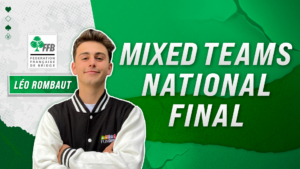
The 2024 Spring Foursomes

The Spring Foursomes is considered to be the most prestigious event on the English bridge calendar, attracting many international players from far and wide. First held in 1962, the ‘Spring Fours’ is now an annual double elimination teams event comprised of nine rounds, held between the Friday and Tuesday either side of the early May bank holiday. The format means you’re never short of a game; if your team loses a match, you remain in contention. If you lose another match, there is a consolation event to drop into called the Punchbowl Knockout. Fail to qualify for that and there is a Swiss teams to play on the Monday for the Hamilton Cup. In the main event, the surviving four teams play off for the Provost Trophy in the semi-finals and final on Tuesday.
This year, 57 teams entered the Fours (out of a maximum 64); nine more than last year. Nowadays, the South-Western city of Bristol holds the event. Sitting on the coast, Bristol naturally boasts a rich maritime history, being used as an important trading port with Ireland since the 11th century. Nowadays, the interweaving waterways of the river Avon, which the city is built on, play host to an array of boats converted into restaurants, shops and pubs. A good thing too, since Bristol has a large student population.

The event wasn’t a good one for my team. After losing a life early on, we rallied on the Sunday and were 32 IMPs ahead going into the final set of Sunday evening, but our opponents, team Lawrenzo, didn’t lie down. They took off-centre actions to try and create swings and played well to boot, chalking up 44 IMPs to claim the match by 12 and knock us out. Here’s one such effort:


After Patrick Lawrence’s exuberant raise to game, Oliver Lawrence was left tackling the play. My teammate led a Diamond, which declarer read as a singleton. In that case, a standard play in trumps was unlikely to work. Declarer needed to pick Spades for one loser, technically requiring West to hold AQ doubleton, AQx or Qx. However, if Diamonds were 4-1, the contract couldn’t be made against the latter distributions. East would be able to get in with a Club to provide a Diamond ruff before trumps were drawn. Declarer could succeed against AQ doubleton, but only if West also had both top Hearts.
Even if Diamonds were 3-2, using the Diamond Queen as an entry to tackle trumps would make the play awkward if the defenders tapped the closed hand with Heart leads while the Diamonds were blocked. Keeping all this in mind, Oliver Lawrence decided to keep his communications in Diamonds open while playing for a much more likely trump position. He won the Diamond Ace in dummy and called for a low Spade! East followed small as most players would, out of pure habit, and now the Spade Jack forced the Ace. When the Spade Queen soon fell beneath the King, declarer had succeeded in losing only one trump trick on a deal where four losers seemed inevitable. Perhaps East should have known his partner had the Spade Ace for his opening bid as West clearly had little in Diamonds, but it’s easier said than done to go up with the Spade Queen. Well done to Oliver Lawrence for finding such a creative play. Had he gone down, his team would have gone with it.
This year’s final was contested by the holders Orca (Allfrey ‒ Robson, Plackett ‒ Erichsen, Crouch ‒ Cope) and the surprise package Hauge (Hauge ‒ McIntosh, Evenstad ‒ Heiberg-Evenstad), originally the 27th seeds who overcame all opposition in the undefeated section. Nicolai Heiberg ‒ Evenstad is only 16 years old but has already made his mark on the game with numerous excellent results such as this. He was in action in this deal from the final, partnering his father Stian:


After an artificial auction, Nicolai declared 4 Hearts on a Diamond lead, won in hand. He played a Club up, West flying in with the Ace and switching to Spades, East’s nine forcing the Ace. At this stage, it might have been attractive to cross to the Club King then run the Heart 10. Declarer can then ruff the Club Queen to gain entry for a further Heart finesse after taking some discards on the Diamonds. However, that line can run afoul of bad breaks as it would here. Nicolai simply played out the Ace and another Heart instead, making at a canter. In the other room, Dan McIntosh continued Diamonds at trick three, giving declarer an easy entry to take the Heart finesse. Declarer later crossed to dummy in Clubs and tried to cash a Diamond before continuing trumps, but he conceded a ruff and with it a second trump trick; he couldn’t re-enter dummy for a second Heart finesse.
The Hauge team won the battle on this deal, but they didn’t win the war. Orca came out on top by 39 IMPs to retain their title. Well done to Alexander Allfrey, Andrew Robson, Richard Plackett, Espen Erichsen, Peter Crouch and Simon Cope on their victory.

The Punchbowl, the secondary knockout event, was won by team Seale: Catherine Draper, Ian Pagan, Catherine Seale and Andrew Woodcock who beat the Duursma team (Judith Duursma, Veri Kiljan, Bart Nab and Meike Wortel) in the final.
The other semi-finalists were team Small (Jon Cooke, John Cox, Martin Nygren, Cameron Small, Peter Taylor & David Willis) and team Fegarty (Paul Barden, Catherine Curtis, Jamie Fegarty and Paul Fegarty).

(Catherine Draper and Andrew Woodcock not present). Used with permission of EBU.

Used with permission of EBU.
The winners of the Hamilton Cup, the Swiss Teams on Monday, were the team of Paul Grünke, Phil King, Matt Brown, Sarah Bell and Mike Bell.
What do you think of this article?
Share your opinion with us in the Comments section below!




Keep it going!